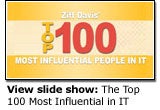The world first learned about Lawrence Lessig when federal Judge Thomas Penfield Jackson appointed him to the post of special master in the U.S. v. Microsoft case in 1997. While his appointment was appealed shortly thereafter and subsequently vacated by the U.S. Court of Appeals, Lessig was invited by Jackson to submit a brief in the case. It was the Microsoft case that catapulted an unknown Harvard Law School professor to being a widely respected thinker who some people suggest may help define the future of the Internet.
After the Microsoft case, Lessig, who now teaches at Stanford University, cemented his role as an influential commentator on the Internet and its future with his book “Code and Other Laws of Cyberspace.” The book suggests that computer code may regulate human behavior as much as laws and that, in many cases, the code that controls the Internet may define intellectual property, especially copyright, in ways that the law does not.
In his writings and commentary, Lessig argues that the rules need to be changed if innovation is to flourish. He suggests, for example, that the manner in which copyright is defined does not work in the current digital world.
“The architecture of the Internet was responsible for the innovation around the network,” Lessig said in an interview. “It brought about innovation because people didn’t need to ask AT&T if they could innovate. [Innovation] must be preserved,” he said. Lessig said that even though companies including AT&T may own the physical infrastructure that comprises the Internet, those companies don’t hold the keys to who uses it or how it’s used.
“I think that companies are increasingly seeing that the existing rules weren’t written for this technology,” Lessig said. “They don’t make sense. They create uncertainty.” Lessig pointed out that YouTube, for example, is suffering from just such uncertainty. “The company can’t realize its full value because the copyright rules are against it,” he said.
While Lessig said he’d like to see legislation that would recognize the changing rules of the Internet, he isn’t counting on it. “The reform will be through private action,” he said. Lessig said he’s already working on this through his organization, Creative Commons, which is fostering flexible copyright licensing. He said his organization has already entered into a deal with the largest insurer of documentary films so that filmmakers can make use of licensing specifically designed to meet their needs, sidestepping today’s restrictive default licensing. “It will radically change how documentaries are done,” he said.
But, as Lessig points out, that’s just one area of innovation that’s affected by intellectual property rules that don’t match the reality of the Internet. Because of this, Lessig has started the Center for Internet and Society, which is intended to help innovators grow by redefining how copyright rules, including fair use, are handled.
Most important, though, is the idea that the environment makes the rules. “Technology is a kind of a regulator,” Lessig said.

